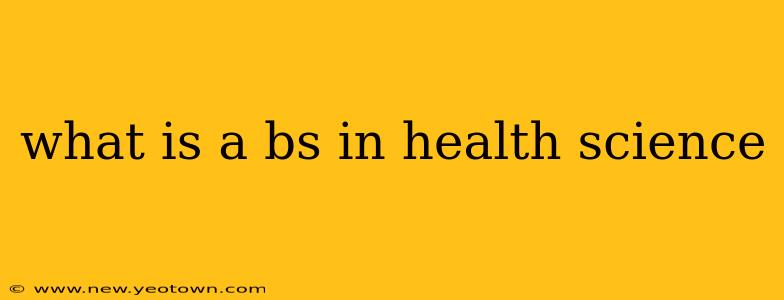What is a BS in Health Science? Unlocking a World of Healthcare Careers
Imagine a world where you're empowered to improve lives, where your passion for health intersects with a rigorous academic journey. That's the essence of a Bachelor of Science (BS) in Health Science. It's not just a degree; it's a launchpad to a diverse array of healthcare professions and a foundation for lifelong learning in a dynamic field. This isn't just another story; it's a glimpse into a career path brimming with opportunities.
My journey into understanding the BS in Health Science began with a simple question: what exactly is it? It wasn't simply about memorizing medical terms; it was about understanding the intricate web connecting individual health, public health initiatives, and the larger healthcare system. It's a holistic approach, blending scientific knowledge with practical application.
This isn't a degree solely for aspiring doctors or nurses, although it can certainly be a stepping stone to those paths. It's a versatile program designed to equip graduates with the critical thinking skills, research methodologies, and broad understanding of the healthcare landscape to succeed in a multitude of roles.
What are the different areas of study within a BS in Health Science?
The beauty of a BS in Health Science lies in its adaptability. The curriculum is often customizable, allowing students to tailor their studies to their specific interests. But some common areas of focus include:
-
Public Health: This focuses on preventing diseases and promoting wellness within communities. Imagine designing public health campaigns, analyzing health data to identify trends, and advocating for health equity.
-
Healthcare Administration: This track equips you with the skills to manage healthcare facilities, from hospitals and clinics to insurance companies and government agencies. It’s about the business side of healthcare—efficiency, resource allocation, and policy development.
-
Health Informatics: The rise of big data in healthcare means professionals are needed to manage, analyze, and interpret health information. This field uses technology to improve healthcare processes and patient outcomes.
-
Pre-Med/Pre-Allied Health: For those with sights set on medical school or other advanced healthcare professions (like physical therapy or occupational therapy), the BS in Health Science provides a strong foundation in biology, chemistry, and anatomy.
-
Biomedical Sciences: Dive deeper into the biological mechanisms of diseases and explore cutting-edge research in areas like genetics and immunology. This track prepares students for research roles or further studies in biomedical fields.
What kind of jobs can you get with a BS in Health Science?
A BS in Health Science is far from a dead-end degree; rather, it's a key that unlocks numerous career pathways. The roles are as diverse as the field itself:
-
Research Assistant: Contribute to vital medical research, assisting scientists in labs and contributing to the advancement of healthcare.
-
Health Educator: Empower communities with knowledge and skills to improve their health outcomes, leading workshops and designing educational materials.
-
Healthcare Administrator: Lead teams, manage budgets, and navigate the complexities of healthcare systems.
-
Medical Coder/Biller: Ensure accurate billing and coding of medical services, a crucial function within healthcare organizations.
-
Public Health Analyst: Analyze data, identify trends, and develop strategies to improve public health.
And many more specialized roles await based on your chosen concentration and further education or certifications.
Is a BS in Health Science a good major?
Whether it's a "good" major depends entirely on your aspirations and interests. If you're passionate about healthcare, possess strong analytical skills, and thrive in a dynamic environment, then a BS in Health Science might be an excellent fit. It opens doors to numerous fulfilling careers, providing a pathway to improve the health and well-being of individuals and communities. The field is ever-evolving, ensuring there's always something new to learn and explore.
What is the difference between a BS in Health Science and a BS in Biology?
While both involve studying biological concepts, a BS in Health Science is more focused on the application of those concepts within a healthcare context. A BS in Biology tends to delve deeper into theoretical research and may have less direct focus on healthcare professions.
What are the prerequisites for a BS in Health Science?
Prerequisites vary from institution to institution but typically include a high school diploma or equivalent and strong performance in science-related courses. Some universities may require specific entrance exams or supplemental application materials.
The story of a BS in Health Science is a story of possibilities, a narrative written not only in textbooks but in the lives touched by those who dedicate themselves to this rewarding field. It's a journey that begins with a question and blossoms into a career defined by purpose, impact, and continuous growth.

